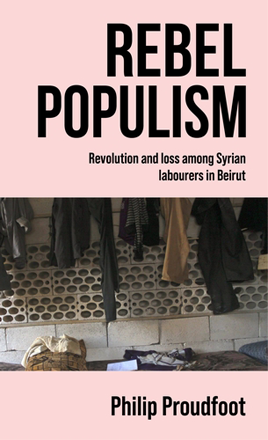You are here
Book sheds light on Syrian workers in Lebanon
By Saeb Rawashdeh - Oct 01,2022 - Last updated at Oct 12,2022

AMMAN — In previous decades, many Syrian workers took part in the post-civil war construction boom in Lebanon, accepting low wages and “unfavourable working conditions”, according to British scholar Philip Proudfoot.
Proudfoot’s remarks came during the launch of his book “Rebel Populism: Revolution and the Loss among Syrian Refugees in Lebanon” at the CBRL Amman Institute on Monday.
“More than one million Syrian citizens live in Lebanon. Many work as builders, never leaving the construction sites,” said Proudfoot
“What characterises the manual labour in Lebanon is that it’s temporary, as no second generation of workers live in the country,” Proudfoot said, noting that Syrians would work between the ages of 18 and 35 without social security or healthcare benefits.
“These jobs were never meant to be for the Lebanese workers, and Lebanese employers benefit from a supply of ‘disposable low rights workers’,” said the anthropologist from the University of Sussex’s Institute of Development Studies.
“Generally, men from rural towns and villages are motivated by opportunities, family struggles, savings, escaping military service and the construction boom,” Proudfoot said, noting that before 2011, Syria underwent rapid economic reforms and the country transformed its autarchic economy into a more market-oriented model of enterprise.
Turning to the main topic of his book, Proudfoot describes populism as “manipulative” and “simplistic”.
“It’s seen as a manipulation, it’s antidemocratic, it’s seen to exploit grievances and it tends to be associated with both right-wing and left-wing political groups,” he said.
“The Arab Spring was a mass movement without a coherent ideology,” Proudfoot said, adding that it wasn’t “a socialist uprising, but rather, populism”.
The Arab Spring was later “co-opted by liberals”, he added, noting that “it was a form of mass politics which emerges not via a charismatic orator or longstanding ideological convictions, but through the weaving together of grievances aimed at the ruling class”.
Before the beginning of the political upheaval in 2011, anthropology as a science was not interested in political topics, Proudfoot said, adding that it studied “exotic” and “apolitical” subjects.
“Anthropology didn’t study political movements and political activism back then,” he said, adding that he hopes that the book takes seriously the “mass part of mass politics”.
Related Articles
AMMAN — The Council for British Research in the Levant (CBRL), also known as The British Institute in Amman, inspires and supports high-qual
BEIRUT — Lebanon's former prime minister Saad Al Hariri said on Thursday he would back Hizbollah ally Michel Aoun to become president, a ste
The Birth of the Arab Citizen and the Changing Middle EastEdited by Stuart Schaar and Mohsine El AhmadiUS: Olive Branch Press/Interlink Publ


















